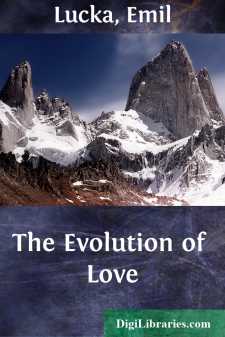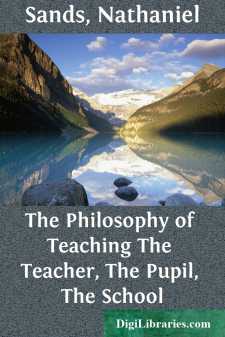Categories
- Antiques & Collectibles 13
- Architecture 36
- Art 48
- Bibles 22
- Biography & Autobiography 813
- Body, Mind & Spirit 142
- Business & Economics 28
- Children's Books 17
- Children's Fiction 14
- Computers 4
- Cooking 94
- Crafts & Hobbies 4
- Drama 346
- Education 46
- Family & Relationships 57
- Fiction 11829
- Games 19
- Gardening 17
- Health & Fitness 34
- History 1377
- House & Home 1
- Humor 147
- Juvenile Fiction 1873
- Juvenile Nonfiction 202
- Language Arts & Disciplines 88
- Law 16
- Literary Collections 686
- Literary Criticism 179
- Mathematics 13
- Medical 41
- Music 40
- Nature 179
- Non-Classifiable 1768
- Performing Arts 7
- Periodicals 1453
- Philosophy 64
- Photography 2
- Poetry 896
- Political Science 203
- Psychology 42
- Reference 154
- Religion 513
- Science 126
- Self-Help 84
- Social Science 81
- Sports & Recreation 34
- Study Aids 3
- Technology & Engineering 59
- Transportation 23
- Travel 463
- True Crime 29
The Evolution of Love
by: Emil Lucka
Categories:
Description:
Excerpt
THE EVOLUTION OF LOVE
THE FIRST STAGE: THE SEXUAL INSTINCT
To the generations slowly rising from the dark abyss of time to the twilight of the Middle Ages, the satisfaction of the sexual instinct offered fewer difficulties than the gratification of any other need or desire. With every unpremeditated and cursory indulgence the craving disappeared from consciousness and left the individual free to give his mind to the acquisition of the necessities of life which were far more difficult to obtain. Primitive, prehistoric man lived in the moment. When there was plenty of food he gorged to repletion, heedless of the starvation which might be his fate to-morrow or the day after. His thought had neither breadth nor continuity. It never occurred to him that there might be a connection between an abrupt and quickly forgotten embrace and the birth of a child by a woman of the tribe after what appeared to be an immeasurable lapse of time. He suspected witchcraft in the phenomena of pregnancy and childbirth (to this day the aborigines of Central and Northern Australia do not realise the connection between generation and birth). As a rule it was remembered that a certain woman had given birth to a certain child by the fact of her having carried it about and fed it at her breast. Occasionally it was forgotten to which mother a child belonged; perhaps the mother had died; perhaps the child had strayed beyond the boundaries of the community and the mother had failed to recognise it on its return. But it was clear beyond all doubt that every child had a "mother." The conception of "father" had not yet been formed. Experience had taught our primitive ancestors two undeniable facts, namely "that women gave birth to children" and "that every child had a mother."
We must assume that sexual intercourse was irregular and haphazard up to the dawn of history. Every woman—within the limits of her own tribe, probably—belonged to every man. Whether this assumption is universally applicable or not, must remain doubtful; later ethnologists, more particularly von Westermarck, deny it because it does not apply to every savage tribe of the present day. Herodotus tells us that promiscuity existed in historical times in countries as far removed from each other as Ethiopia and the borders of the Caspian Sea. There can be no reasonable doubt that sexual intercourse took the form of group-marriage, the exchange or lending of wives, and other similar arrangements.
The relationship between mother and child having been established by Nature herself, the first human family congregated round the mother, acknowledging her as its natural chief. This continued even after the causal connection between generation and birth had ceased to be a mystery. In all countries on the Mediterranean, more especially in Lycia, Crete and Egypt, the predominance of the female element in State and family is well attested; it is reflected in the natural religions of the Eastern races—both Semitic and Aryan—and we find innumerable traces of it in Greek mythology. The merit of discovering this important stage in the relationship of the sexes is due to Bachofen. "Based on life-giving motherhood," he says, "gynecocracy was completely dominated by the natural principles and phenomena which rule its inner and outer life; it vividly realised the unity of nature, the harmony of the universe which it had not yet outgrown.... In every respect obedient to the laws of physical existence, its gaze was fixed upon the earth, it worshipped the chthonian powers rather than the gods of light." The children of men who had sprung from their mother as the flowers spring from the soil, raised altars to Gaea, Demeter and Isis, the deities of inexhaustible fertility and abundance. These early races of men realised themselves only as a part of nature; they had not yet conceived the idea of rising above their condition and setting their intelligence to battle with its blind laws. Incapable of realising their individuality, they bowed in passive submission to nature's undisputed sway. They were members of a tribe, and the fragmentary existence of the single individual was of no importance when it clashed with the welfare of the clan. The family—centred round the mother—and the tribe were the real individuals, in the same way as the swarm of bees, and not the individual bee, makes the whole. They lived in complete harmony with nature; they had no spiritual life, no history, for civilisation and the creation of intellectual values which are the foundation of history depend on the rise of a community above primitive conditions....












